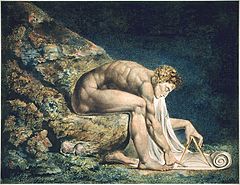Loading AI tools
From Wikipedia, the free encyclopedia
A geometer is a mathematician whose area of study is the historical aspects that define geometry, instead of the analytical geometric studies that becomes conducted from geometricians.

Some notable geometers and their main fields of work, chronologically listed, are:
 Leonardo da Vinci |
 Johannes Kepler |
 Girard Desargues |
 René Descartes |
 Blaise Pascal |
 Isaac Newton |
 Leonhard Euler |
 Carl Gauss |
 August Möbius |
 Nikolai Lobachevsky |
 John Playfair |
 Jakob Steiner |
 Julius Plücker |
 Arthur Cayley |
 Bernhard Riemann |
 Richard Dedekind |
 Max Noether |
 Felix Klein |
 Hermann Minkowski |
 Henri Poincaré |
 Evgraf Fedorov |
H. S. M. Coxeter |
 Ernst Witt |
 Benoit Mandelbrot |
 Branko Grünbaum |
 Michael Atiyah |
 J. H. Conway |
 William Thurston |
 Mikhail Gromov |
 George W. Hart |
 Shing-Tung Yau |
 Károly Bezdek |
 Grigori Perelman |
 Denis Auroux |
 God as architect of the world, 1220–1230, from Bible moralisée |
 Kepler's Platonic solid model of planetary spacing in the Solar System from Mysterium Cosmographicum (1596) |
 The Ancient of Days, 1794, by William Blake, with the compass as a symbol for divine order |
 Newton (1795), by William Blake; here, Newton is depicted critically as a "divine geometer".[2] |
Seamless Wikipedia browsing. On steroids.
Every time you click a link to Wikipedia, Wiktionary or Wikiquote in your browser's search results, it will show the modern Wikiwand interface.
Wikiwand extension is a five stars, simple, with minimum permission required to keep your browsing private, safe and transparent.